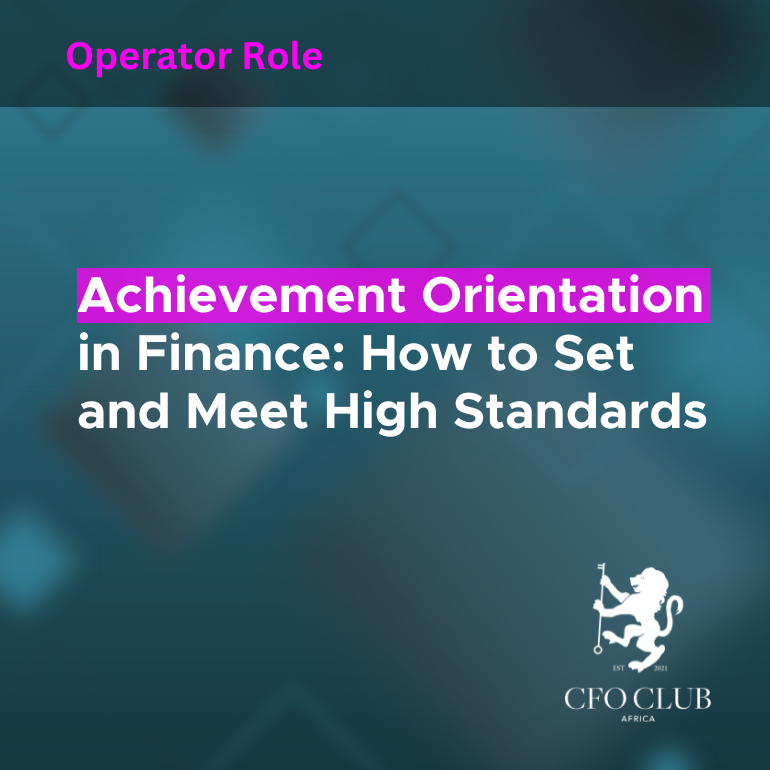Achievement Orientation in Finance: How to Set and Meet High Standards
As a CFO, you play a key role in setting the tone for performance in your organisation. Achievement orientation is about more than meeting deadlines or hitting financial targets—it’s about consistently striving for excellence and encouraging your team to do the same. The good news? You don’t need complicated systems or big words to make this happen. Simple, practical steps can make a real difference.
Start by Defining High Standards
To achieve high standards, you first need to define what they look like in your role. This isn’t about aiming for perfection but about setting clear expectations. For example, is it delivering error-free financial reports? Providing actionable insights to the leadership team? Or perhaps ensuring your department runs like a well-oiled machine?
Take the time to map out what “excellence” means in your key responsibilities. When you know what you’re aiming for, you can create a focused plan to get there.
Set Goals That Make Sense
Goals are at the heart of achievement. But vague goals like “improve reporting” or “be more strategic” don’t help anyone. Instead, focus on goals that are specific and realistic. For instance, instead of saying, “We need to work faster,” you might aim to reduce the month-end closing process by three days within the next quarter.
Clear goals make it easier for your team to understand what’s expected. They also allow you to measure progress and celebrate successes along the way.
Lead by Example
As a CFO, your team looks to you for guidance. If you show up prepared, meet deadlines, and deliver work of high quality, your team will be more likely to do the same. On the other hand, if you let details slip or miss deadlines, it sends the message that high standards don’t matter.
You don’t have to be perfect, but consistency is key. When you set the bar high for yourself, it encourages others to rise to the occasion.
Create a Culture of Accountability
Accountability is a big part of achieving high standards. It means everyone on the team takes ownership of their work and understands how their role contributes to the bigger picture.
You can foster this culture by being clear about responsibilities and following up on progress. When someone does well, acknowledge it. When something goes wrong, focus on solutions instead of blame. The goal is to create an environment where everyone feels motivated to do their best.
Encourage Learning and Growth
Finance is always changing, and staying on top of new trends and tools is important. Encourage your team to keep learning by sharing articles, recommending courses, or even hosting a quick training session on a topic like AI in finance or sustainability reporting.
This doesn’t have to be formal or time-consuming. Sometimes, a 10-minute discussion in a team meeting can spark new ideas and help your team improve. The key is to show that growth and learning are valued.
Feedback as a Growth Tool
Feedback is one of the most effective ways to help your team improve. Make it a regular part of your workflow, not just something that happens during annual reviews.
For example, after a project wraps up, spend a few minutes discussing what went well and what could be better next time. Keep the tone positive and focused on improvement. When feedback is constructive and actionable, it builds trust and helps your team grow.
Celebrate Progress
Achievement orientation isn’t just about the final goal. It’s also about recognising the small wins along the way. When your team achieves a milestone, take the time to celebrate. This could be as simple as a shoutout in a meeting or a quick email saying, “Great job!”
Celebrating progress keeps morale high and reminds everyone that their hard work matters. It also creates a positive momentum that makes it easier to tackle the next challenge.
Final Thoughts
Being achievement-oriented doesn’t mean working harder or longer hours—it’s about working smarter and setting your team up for success. By focusing on clear goals, leading by example, encouraging learning, and celebrating progress, you can create an environment where excellence becomes the norm.
Start small, stay consistent, and watch your team and organisation thrive.

